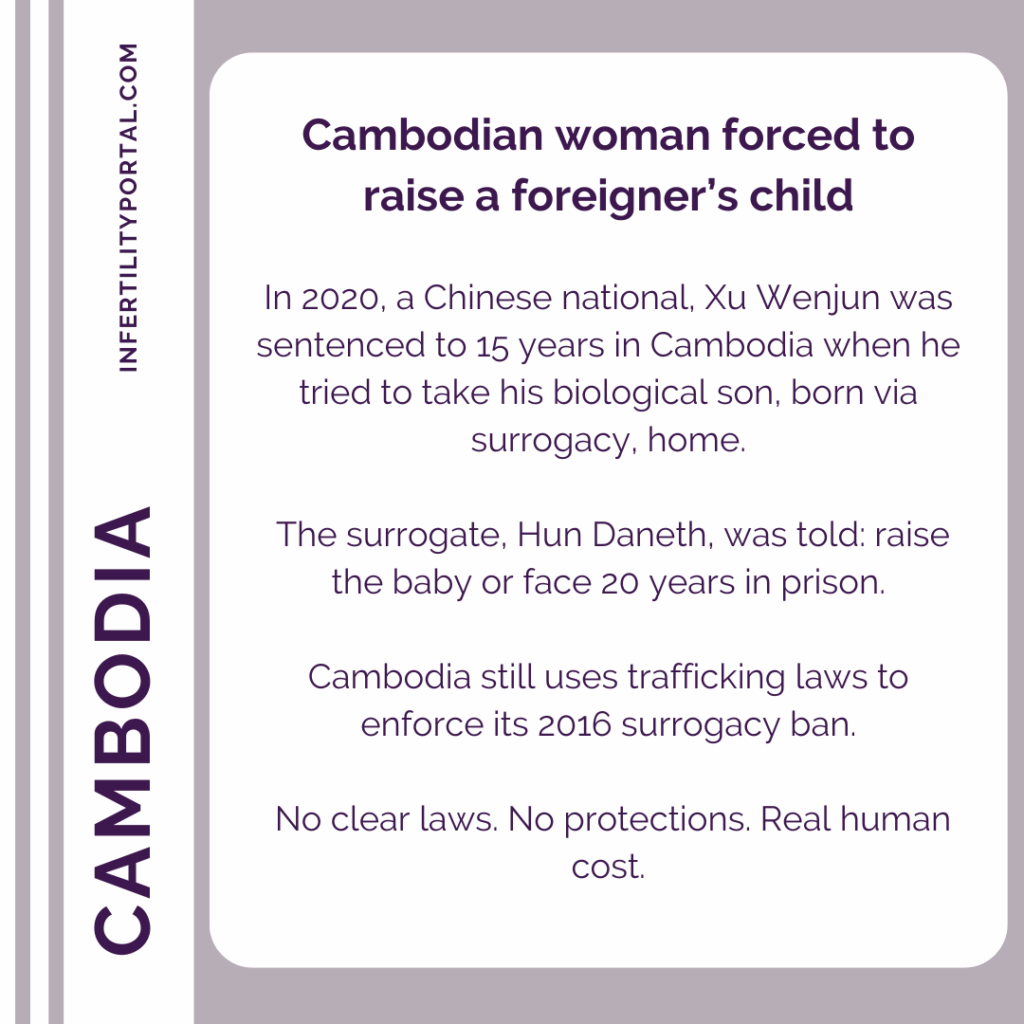Punishment Over Parenthood: Cambodia’s Surrogacy Crackdown Leaves a Woman Raising a Stranger’s Child
In a small home in Phnom Penh, a woman named Hun Daneth is raising a little boy she once carried for someone else.
He was never supposed to be her son. But because of Cambodia’s aggressive and punitive stance on surrogacy, he became her responsibility, or her sentence.
This is not a heartwarming adoption story. It is a story of legal overreach, systemic failure, and a woman caught between criminal charges and coerced motherhood.
A Promise, Then a Raid
In 2017, Hun Daneth was a 25-year-old garment factory worker when she was approached with an offer: serve as a surrogate for a Chinese man, using a Russian egg donor, in exchange for US $9,000. As a mother herself, she saw it as an opportunity to provide a better life for her own child.
Once pregnant, she was moved into a villa in Phnom Penh, housing more than 30 other Cambodian women participating in similar arrangements. But this was not a legal surrogacy arrangement.
In 2016, Cambodia banned commercial surrogacy. But instead of introducing specific legislation to regulate or transition the industry, the government began using human trafficking laws to prosecute everyone involved. This included prosecuting the surrogates themselves.
In 2018, when Daneth was eight months pregnant, police stormed the villa, arrested the women, and charged them all with trafficking. She and others gave birth in a military hospital, shackled during delivery.
It was a message to all: surrogacy is criminal, regardless of context.
Raise the Child or Go to Prison
Facing a potential 20-year prison sentence, Daneth was offered an extraordinary deal: raise the child she had carried or be incarcerated for two decades. This child, conceived by a Chinese father and a Russian egg donor, was not biologically hers. But she accepted the condition, naming him “China” as a nod to the man who had intended to raise him.
She later shared:
“Before he was born, I did not like him. I got angry with him and questioned why I am here today. After I delivered him, I felt that those thoughts disappeared. Anger and hatred are all gone, and only love remains.”
Daneth has since bonded with the child and is doing her best to raise him with love. But that does not change the fact that her choice was taken from her, first by a legal system that sees surrogacy as trafficking, and second by a policy that punished her for trying to help another family.
Cambodia’s Surrogacy Ban Protects No One
Since banning commercial surrogacy in 2016, Cambodia has failed to introduce a framework for ethical or altruistic surrogacy. Instead, it has criminalized an entire reproductive practice by conflating it with human trafficking.
As a result:
-
Intended parents are afraid to come forward.
-
Women are recruited through underground networks with no legal protections.
-
Children, like the one Daneth is raising, are left without citizenship, identity, or legal clarity.
-
Biological parents, like Chinese national Xu Wenjun, are serving long prison sentences for trying to take their children home.
What Cambodia Needs
Banning surrogacy does not make it disappear. It drives it underground, where exploitation thrives and protection vanishes.
Cambodia should:
-
Introduce surrogacy-specific legislation that clearly distinguishes it from trafficking
-
Set enforceable age, health, and consent standards
-
Ensure that surrogates have independent legal and psychological support
-
Protect the rights of the child to identity and parentage
-
Allow for transparent, ethical agreements between intended parents and surrogates
Until that happens, stories like Daneth’s will continue—stories where women are criminalized for compassion, and children are denied the futures intended for them.
Final Thoughts
Hun Daneth is not a criminal. She is a woman who agreed to carry a child for someone else and was forced to raise him instead. Hun wanted to give her own child a better future. Her story is not an anomaly, it is a consequence of a legal system that chooses punishment over protection.
Surrogacy is not the problem.
The absence of ethical regulation is.


